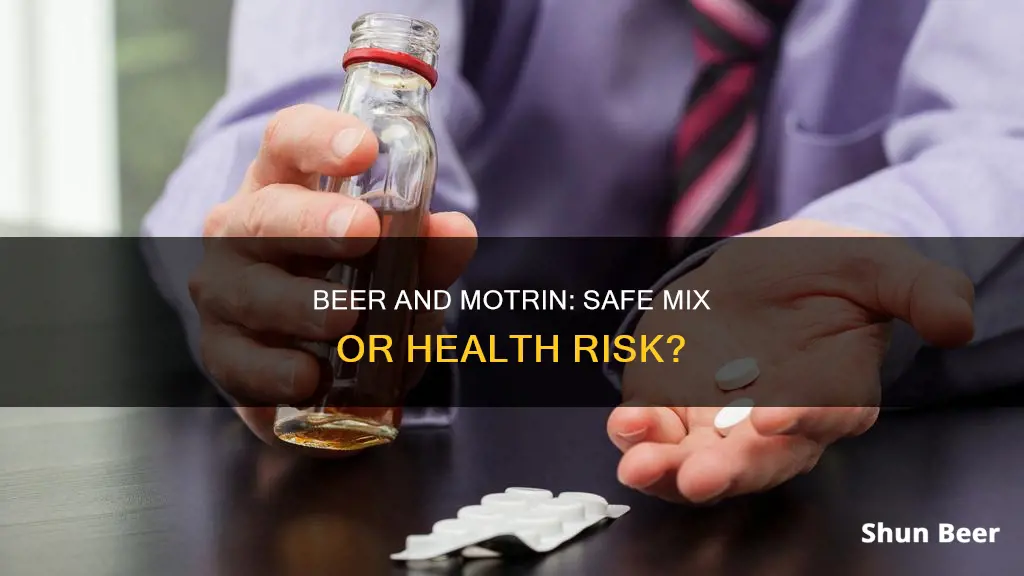
Motrin, also known as ibuprofen, is a nonsteroidal anti-inflammatory drug (NSAID) commonly used to relieve pain, swelling, and fever. While it is generally safe to consume a small amount of alcohol while taking the recommended dose of Motrin, regular and excessive alcohol consumption can increase the side effects of this medication. Mixing the two can lead to serious health issues, especially for older adults and individuals with certain health conditions. Therefore, it is important to understand the potential risks and always exercise caution when combining Motrin and alcohol.
What You'll Learn

Gastrointestinal bleeding
The most common cause of GI bleeding is peptic ulcers, which are sores that develop on the stomach lining or small intestine. Long-term use of certain anti-inflammatory drugs, such as ibuprofen, can contribute to the growth of peptic ulcers. Alcohol consumption can also irritate the stomach and digestive tract, increasing the risk of GI bleeding.
Combining alcohol with nonsteroidal anti-inflammatory drugs (NSAIDs), such as ibuprofen, further increases the risk of GI bleeding. A study of 1,224 participants showed that regular use of ibuprofen raised the risk of stomach and intestinal bleeding in people who consumed alcohol. Heavy alcohol consumption, in particular, increases the risk of GI bleeding. The risk of GI bleeding is also higher for older adults who mix alcohol and ibuprofen due to their decreased ability to process alcohol.
The symptoms of GI bleeding include vomiting red or black blood, blood in the stool, or black stool. If you experience any of these symptoms, seek emergency medical attention.
To prevent GI bleeding, it is recommended to avoid mixing alcohol and ibuprofen. If you take ibuprofen regularly, limit your alcohol consumption to moderate levels, which is one drink per day for women and two drinks per day for men. It is also important to follow the recommended dosage and take ibuprofen for the shortest time possible to reduce the risk of GI bleeding.
Diabetics and Rolling Rock Beer: Is It Safe?
You may want to see also

Kidney damage
Motrin, also known as ibuprofen, is a nonsteroidal anti-inflammatory drug (NSAID) that is available over the counter. It is designed to relieve pain, swelling, and fever. While taking the recommended dose of Motrin with a small amount of alcohol is typically not harmful, regular use of both substances can have adverse effects on the stomach and kidneys.
The kidneys filter harmful substances from the body, including alcohol. The more alcohol a person consumes, the harder the kidneys have to work. Motrin, as an NSAID, affects kidney function by inhibiting the production of the enzyme cyclooxygenase (COX) in the kidneys. This inhibition reduces inflammation and pain but also impacts the kidneys' ability to filter toxins effectively.
Alcohol consumption, particularly in excessive quantities, can cause dehydration, making it even harder for the kidneys to filter toxins. Additionally, alcohol can lead to high blood pressure, which is a common cause of kidney disease. Regular heavy drinking has been associated with an increased risk of developing chronic kidney disease.
When Motrin and alcohol are combined, the risk of kidney problems is significantly heightened. This combination can lead to acute kidney injury, which may require dialysis until kidney function returns to normal. In some cases, acute kidney injury can result in lasting kidney damage.
It is important to note that the risk of kidney problems is particularly elevated for individuals with existing kidney issues or those with certain underlying medical conditions, such as liver disease, high blood pressure, or heart failure. Therefore, it is crucial to consult a doctor before consuming alcohol if you are taking Motrin, especially if you have any pre-existing health conditions.
Beer After Cycling: What's the Harm?
You may want to see also

Lack of alertness
Mixing Motrin (ibuprofen) and alcohol can lead to a lack of alertness, which can be dangerous. Both substances can cause drowsiness and sleepiness, and combining them may make this worse. This can lead to slowed reaction times, impaired coordination, and increased risk of accidents. It is never safe to drink alcohol and drive, and consuming both Motrin and alcohol together can further impair your ability to drive or operate machinery.
The combination of Motrin and alcohol can also lead to excessive sleepiness or an inability to function normally. This can impact your daily activities and put you at risk of accidents or injury. It is important to be aware of the potential side effects of mixing Motrin and alcohol and to avoid activities that require alertness and coordination.
The effects of Motrin and alcohol on alertness can vary depending on several factors, including the amount of alcohol consumed, the dosage of Motrin, and individual factors such as age, weight, and medical history. However, even small amounts of alcohol can increase the risk of side effects when combined with Motrin. It is generally recommended to avoid mixing Motrin and alcohol or to consume them at different times with a significant interval between them.
If you experience a lack of alertness or other side effects after taking Motrin and alcohol, it is important to seek medical advice. Additionally, if you have any concerns or questions about mixing Motrin and alcohol, consult your healthcare provider, who can assess your individual risk factors and provide personalized advice.
Drinking Beer Daily: Is It Healthy or Harmful?
You may want to see also

Increased risk of heart problems
Motrin, also known as ibuprofen, is a nonsteroidal anti-inflammatory drug (NSAID) that is available over the counter and is used to relieve pain, swelling, and fever. While taking the recommended dose of ibuprofen with a small amount of alcohol is usually not harmful, regularly mixing the two can have adverse effects on your health.
People with underlying medical conditions, such as liver or kidney disease, high blood pressure, or heart failure, are at the highest risk of experiencing serious side effects from mixing Motrin and alcohol. This is because both substances can irritate the stomach and digestive tract, increasing the risk of ulcers and bleeding. Additionally, ibuprofen can affect kidney function, and when combined with alcohol, which can cause dehydration and hinder the kidneys' ability to filter toxins, the risk of kidney problems is significantly heightened.
Furthermore, ibuprofen and alcohol both have relaxing effects on the body, which can lead to increased drowsiness, impaired coordination, and slowed reaction times. Consuming alcohol and taking ibuprofen simultaneously can therefore significantly increase the risk of accidents, especially when driving.
Long-term, high-dose use of ibuprofen has also been linked to an increased risk of cardiovascular events such as heart attacks and strokes. Combining ibuprofen with alcohol can further elevate this risk, especially for those with existing cardiovascular risk factors such as hypertension, high cholesterol, diabetes, or a history of heart disease.
In summary, while an occasional glass of beer with ibuprofen may be safe for most healthy individuals, regular and excessive consumption of alcohol alongside ibuprofen use can lead to serious health problems, including gastrointestinal bleeding, kidney damage, and an increased risk of cardiovascular events. It is crucial to follow the recommended dosage instructions and consult a doctor if you have any concerns or underlying health conditions.
Beer and IBS: Is There a Link?
You may want to see also

Less effective medication
Mixing medications with alcohol can make the medication less effective while simultaneously worsening the side effects of the substances. For example, ibuprofen is a medication designed to relieve pain, swelling, and fever. It is sold under a variety of brand names, such as Advil, Midol, and Motrin, and is available over the counter. While occasionally taking the recommended dose of ibuprofen with alcohol is typically not a cause for concern, doing so regularly can be harmful to your stomach and kidneys.
Ibuprofen can irritate the digestive tract, and when taken for an extended period or in high doses, it can increase the risk of gastric ulcers or bleeding in the digestive tract. Alcohol can also irritate the stomach and digestive tract, and mixing the two further increases the risk of ulcers and bleeding.
Additionally, ibuprofen can affect kidney function, and alcohol can cause dehydration, making it hard for the kidneys to filter toxins. This combination can lead to kidney damage, and the risk is higher for those with chronic kidney disease.
It is important to note that the combination of ibuprofen and alcohol can also lead to increased drowsiness, as both substances can cause sleepiness. This can result in excessive sleepiness or an inability to function normally.
Therefore, while it may be generally safe to consume a small amount of alcohol while taking ibuprofen, it is always advisable to exercise caution and avoid mixing the two when possible.
Beer and Women: A Perfect Pairing?
You may want to see also
Frequently asked questions
It is generally not recommended to mix Motrin (ibuprofen) and alcohol. While having a small amount of alcohol, such as a single drink, with Motrin is usually okay for most people, moderate to excessive drinking can increase the side effects of Motrin, such as gastrointestinal issues and kidney problems.
Mixing Motrin and beer can lead to an increased risk of gastrointestinal bleeding, kidney damage, liver problems, and a lack of alertness due to the combined effect of both substances.
It is recommended to wait at least 4 to 6 hours after consuming alcohol before taking Motrin. If you have a history of gastrointestinal issues, you may want to wait even longer or avoid mixing the two altogether.
It is generally not advisable to mix alcohol with any pain relievers, including Motrin. Alcohol can irritate the stomach and intestine lining, and combining it with Motrin can further increase the risk of ulcers and bleeding.
No, there are no pain medications that are not affected by alcohol. All painkillers carry their own risks when mixed with alcohol. It is always best to consult a doctor or pharmacist if you are unsure about mixing medications with alcohol.







